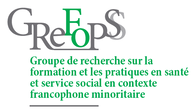The Directory of Innovative Practices (previously the Handbook of Innovative Practices on the Integration of Social and Health Services in Official Languages in a Minority Context) is a complementary resource to the Organizational and Community Resources Self-Assessment Tool for Active Offer and Social and Health Services Continuity. In this document, users will find initiatives that are most often implemented at the local level. These initiatives meet a community need and are perceived as innovative by the various actors involved in their execution. Practices were identified, analyzed and ranked according to an evaluation framework developed by the Health Council of Canada. This framework allowed us to make a distinction between emerging, promising, and leading practices. Some of these practices were put forth by the Société Santé en français and provincial, territorial and regional Francophone health networks. We identified more practices through our own research and that of our partners, as well as from findings of a preliminary review conducted in 2016 while the self-assessment tool was being developed. An update was conducted in February-March 2021, at which time additional initiatives were added to the directory.
Analyzed against strict criteria, the practices described in this handbook are unique, original, and generated positive changes within organizations.
They may encourage social and health services providers to design and tailor such measures to their own context and organization, thereby improving the continuum of official language health and social services in a minority context.
Analyzed against strict criteria, the practices described in this handbook are unique, original, and generated positive changes within organizations.
They may encourage social and health services providers to design and tailor such measures to their own context and organization, thereby improving the continuum of official language health and social services in a minority context.
Introduction and Method
Practice 1: Actionmarguerite's Language Mandate: An Implementation Guide (Manitoba)
Practice 2: Summerset Manor’s Francophone Household (Prince Edward Island)
Practice 3: The Pavillon Omer Deslauriers: A Francophone Unit at Bendale Acres (Ontario)
Practice 4: Linguistic Variable Integration in Data Collection (Prince Edward Island)
Practice 5: The Framework for Recruitment and Retention of Bilingual Human Resources in the Health Sector and the Health Human Resources Strategy (Pancanadian)
Practice 6: The Café de Paris (New Brunswick)
Practice 7: The Francophone Institutions Tour (Manitoba)
Practice 8: A Bilingual Nurse-Coordinator in a Halifax Hospital (IWK Health) (Nova Scotia)
Practice 9: Primary Care Outreach to Seniors (Ontario)
Practice 10: Satellite Service Points (Ontario)
Practice 11: The Information and Support Guide for Caregivers (Quebec)
Practice 12: Lunch and Chats at the Vanier Community Service Centre (Ontario)
Practice 13: A Public Health Nurse in a Community Service Centre: Ensuring Seniors’ Referral to Resources (Ontario)
Practice 14: The Fédération des aînés et des retraités francophones de l’Ontario (FARFO)’s Information Fairs (Ontario)
Practice 15: The Townshippers’ Association Health and Social Services Component (Quebec)
Practice 16: French-Language Placements to Help Serve a Francophone Minority Community’s Francophone Clientele (Ontario)
Practice 17: Horizon Health Network’s Dialogue Sessions (New Brunswick)
Practice 18: Horizon Health Network’s Contingency Plan (New Brunswick)
Practice 19: Horizon Health Network’s Reminder Tools (New Brunswick)
Practice 20: Talking About Mental Illness (TAMI) in French (Northwest Territories)
Practice 21: ConnectAînés (Pancanadian)
Practice 22: Sentinelles entre aînés (Pancanadian)
Practice 23: Francophone Health System Navigator (Newfoundland and Labrador)
Practice 24: Welcoming Community (Ontario)
N.B. The reader is invited to consult the Introduction and Method document before downloading the individual sheets.
Practice 1: Actionmarguerite's Language Mandate: An Implementation Guide (Manitoba)
Practice 2: Summerset Manor’s Francophone Household (Prince Edward Island)
Practice 3: The Pavillon Omer Deslauriers: A Francophone Unit at Bendale Acres (Ontario)
Practice 4: Linguistic Variable Integration in Data Collection (Prince Edward Island)
Practice 5: The Framework for Recruitment and Retention of Bilingual Human Resources in the Health Sector and the Health Human Resources Strategy (Pancanadian)
Practice 6: The Café de Paris (New Brunswick)
Practice 7: The Francophone Institutions Tour (Manitoba)
Practice 8: A Bilingual Nurse-Coordinator in a Halifax Hospital (IWK Health) (Nova Scotia)
Practice 9: Primary Care Outreach to Seniors (Ontario)
Practice 10: Satellite Service Points (Ontario)
Practice 11: The Information and Support Guide for Caregivers (Quebec)
Practice 12: Lunch and Chats at the Vanier Community Service Centre (Ontario)
Practice 13: A Public Health Nurse in a Community Service Centre: Ensuring Seniors’ Referral to Resources (Ontario)
Practice 14: The Fédération des aînés et des retraités francophones de l’Ontario (FARFO)’s Information Fairs (Ontario)
Practice 15: The Townshippers’ Association Health and Social Services Component (Quebec)
Practice 16: French-Language Placements to Help Serve a Francophone Minority Community’s Francophone Clientele (Ontario)
Practice 17: Horizon Health Network’s Dialogue Sessions (New Brunswick)
Practice 18: Horizon Health Network’s Contingency Plan (New Brunswick)
Practice 19: Horizon Health Network’s Reminder Tools (New Brunswick)
Practice 20: Talking About Mental Illness (TAMI) in French (Northwest Territories)
Practice 21: ConnectAînés (Pancanadian)
Practice 22: Sentinelles entre aînés (Pancanadian)
Practice 23: Francophone Health System Navigator (Newfoundland and Labrador)
Practice 24: Welcoming Community (Ontario)
N.B. The reader is invited to consult the Introduction and Method document before downloading the individual sheets.


